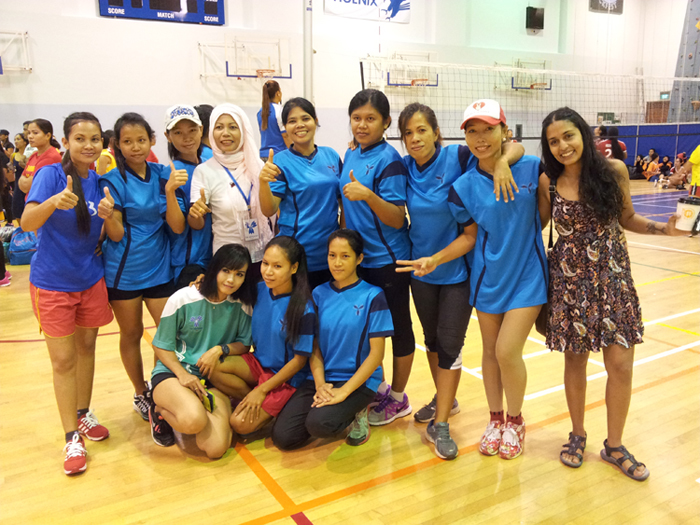Southeast Asian women, migration and family in the global era

In 2018, CAPI Visiting Scholar Leslie Butt, a professor with UVic's Anthropology department, and her international team completed research on how migrant professional women from Indonesia negotiate family relations in conditions of high mobility, shifting expectations concerning parenting, and exposure to transnational values around family and childrearing.
The project, funded by a SSHRC Insight Grant, involved conducting interviews, carrying out field research with families, and setting up and tracking social media practices among mobile working families in three main locations: Singapore, Australia, and Canada.



Project team
- Lead investigator: Leslie Butt, Professor, Department of Anthropology, UVic
- Project collaborators: Deirdre McKay (Keele Uni, UK) and Nicole Constable (Pittsburgh, USA)
- Postdoctoral researcher: Monika Winarnita (La Trobe, Australia)
- Senior researchers: Nur Aisyah Kotarumalos (NUS, Singapore) and Carol Chan (Uni Alberto Hurtado, Chile)
- UVic graduate students: Raviv Litman, Charlene Mohammed, Jenny Francoeur, and Alex Lloyd
The results draw out the many and unexpected challenges transnational women face when it comes to doing the work of raising families and remaining connected to family at home. Among our respondents,
- one infertile couple secretly imports traditional Indonesian fertility treatments into Singapore to try and help them conceive a child;
- a married couple lived apart for several years, with their infant child migrating between two countries and two parents;
- a couple sacrificed their business and close family networks in Indonesia to relocate for their child’s health;
- a mother who gave birth in Singapore during an Indonesian political crisis endured a forced two-year separation from her husband; the events linger on and shape her fears and ambivalence about her home country.
These women’s stories help us question arguments that privilege rational economic explanations over family needs and goals as a key factor shaping migrant family lives. We found absence and separation from family to be key emotional challenges for virtually all respondents. We found cares and concerns around children, spouses, and cultural values were significant motivators for how women and families moved about the world and how they chose to live their lives.
Facebook and family
One segment of our study focused on how transnationally mobile women use facebook. We “friended” respondents who agreed to be observed in their social media usage over the course of two years. Looking closely at what kinds of family photos women chose to post on facebook, at first glance many family photos seemed to be repetitious and banal. The tedium of family photographs are what make them valuable, scholars argue, for they communicate solidarity, a happy togetherness, an “everything is fine here” feeling.
Our respondents posted volumes of family images, but each woman did this in a different way, revealing her personal aspirations and emotions through the patterns in her postings. Based on previous research, we expected these Southeast Asian women to make many references to Indonesia in their postings, and to use facebook to connect with family at home. Indeed, some women posted formal pictures of their family in front of iconic monuments intended for consumption by faraway kin. Some respondents, for example, posted photos of themselves dressed up in recreations of traditional Indonesian homesteads. These women consistently presented themselves online in morally conformist ways, overall reflecting cultural expectations from home about appropriate behavior for a woman, wife, and mother.
Others, however, seemed deliberately not to fall into these patterns. Instead, women quietly displayed their disengagement with expectations from home, and showed their connections to their new lives through family postings which shunned posed family photos in favour of everyday images.
Through online sharing of everyday photos, and emphasizing travel, photographs of friends, and outings and activities with work colleagues, women showed themselves as more cosmopolitan. The diverse patterns tracked in women’s facebook accounts help us question the tendency to view diasporic communities as homogenous, and to essentialize mobile women as bounded by their relationships and obligations to their families, and to expectations in their home communities.
Talking Back to Mom and Dad: Southeast Asian Youth, Mobility, and Agency

Four UVic graduate student theses supported by this study explored how mobile young men and women within Southeast Asian families cope with mobility. Each student tackled under-addressed topics in the literature on family migration. These include family obligations for returning Singaporean students, sexualities among Filipino and Indonesian youth studying overseas in Australia and Canada, and workplace challenges for young Indonesian women employed in Singapore. The four theses document powerful first hand-accounts based on in-depth interviews and participant observation. Their results increased understanding of how constraints imposed by family can shape the personal agency of mobile youth. Young adults have to navigate very powerful cultural expectations – often expressed overtly, other times more subtly yet still forcefully – to give back to families in order to remain connected to family. Youth seized the chance mobility offered to advance their own goals and take control over their lives. They used tactics to advance their personal goals while remaining connected with family. They show how young adults found family obligations to be powerful and often onerous, sometimes debilitating and disheartening, but always navigable.

Raviv's blog
Playing hard to get: Singapore sons turn the tables on parental allowance
Pressure at home has you on edge? For financially frustrated youth in Singapore, online message boards are one safe place to talk about parents piling financial demands too high. One such message reads:
I've not went on any holidays since I started work …my mom has went on 4 holidays, got herself the latest iphone and has plans to get herself a new laptop. Yet she constantly tells me that my [financial] contribution is not enough. #filialpiety.
This posting tells a public group of readers that when a mom has a higher standard of living than a child and still wants the child’s money, something is off. Generations of Singaporean young adults have given allowances to their parents when they join the workforce, a long cultural tradition that predates Singapore’s independence in 1966. In interviews I conducted in 2015, 15 out of 17 Singaporean young men under the age of 25 said they engaged or planned to engage in the practice of giving a percentage of their income to their parents. The amounts given ranged between 5-15% of their working salaries. This tradition continues to have strong support from Singaporean government ministries, including the Singapore Armed Forces and the Ministry of Health, who promote filial piety and parental support by children because of the cost-saving measures this offers the state. But patterns are changing, my research shows, and children want to teach their parents another type of responsibility before they begin to pay their parents their taken-for-granted allowance.
Singapore’s government campaigns use happy families in their advertisements to encourage children to link their financial future to their parents’ by paying subsidies to ease costs for aging parents.

It’s a picture perfect future, but for younger Singaporeans entering the workforce, the construct of multi-generational financial harmony has strings attached. Will Chun, a recent graduate of a sustainable tourism degree acquired overseas, and a budding entrepreneur, has an immature father who fights with his uncle and grandparents. Before Will was willing to pay his father an allowance, he needed it to be a learning experience for his family:
For my parents their parents decided everything about their lives. Controlled... But for me with education, with how globalized I am…that’s why you have to play hard-to get [with your parents] sometimes. [He laughs]. Like my father is definitely in favor of an allowance, and I will definitely care for him, but I can't give it to him so easily.
Will encapsulates the shifting position of a generation of globalized Singaporean youth: parents must make financial requests of their children from a place of love. If they instead insist on their right to receive an allowance based on tradition, they might find their children withholding their allowance until they change their tune.
In my interviews and participant observation with Singaporean sons who had studied overseas, these shifting demands were particularly apparent. Privileged Singaporean college students are constantly recruited to colleges in the UK, USA or Australia, an undertaking that most often requires financial bondage to government sponsors. These bonds are typically paid by students’ parents. The college debt sets a tone for graduates, who must find work fast when they return home to start paying off their government bonds. Returning students feel pressure to toe the line, which means among other duties feeling pressure to participate in government programs such as funding retiring parents. But returning students have chips to play too: once they have identified with a global lifestyle and connected with friends and employers overseas, graduates can consider staying abroad or moving back overseas, even at risk of breaking their parents’ bonds or causing penury for parents in their old age. Government ministries have tried to minimize this risk in the late 2000s, by building a global networking programs to incentivize students to return, reminding them when they are away that they are appreciated by the country and by their families.
When a globalized youth challenges traditional controls of Singaporean parents, power shifts from parents to children. The gambit is set: When children can play hard to get, and it is hard to get them home, the value of their presence goes up and their values --of love over duty -- gain in value.


Charlene's blog
Subverting cultural plans, creating new futures: young Indonesian domestic workers in Singapore
Every year, thousands of young women from low-income Indonesian households migrate to Singapore to work as domestic helpers. They take up these jobs to improve their families’ lives by sending remittances home. At the same time, they subvert cultural expectations. Even though they work to improve their families’ well-being, they also work to distance themselves from their families.
My research in 2017 with 28 Indonesian domestic workers shows parents of unmarried daughters want to keep close control, regularly urging their daughters to give up domestic work in Singapore and return home to get married. One worker named Melati described how she struggled with her parents’ desire for her to have a husband and children:
My father … keep thinking of me – “You working so long [in Singapore], when you married?” This is the question every day that [my parents] ask me. I very stressed. They like to compare me with my friends, “They have children, blah blah blah.” Of course me and my friends are different.
Melati resisted her parents’ wishes and delayed marriage and children. She continued to work in Singapore even though her parents tried to force her to return.
Many domestic workers with family problems used migration as a chance to carve out new identities for themselves. When Putri was just a teenager, her parents encouraged her to work in Singapore so she could earn money to support her family. However, after working there a few years, Putri realized that her parents were treating her like a walking ATM. Putri had to learn how to manage her parent’s desire to be in control of most of her monthly salary:
When I went home for the first time, my house was a big mess and I found out that my parents took out so many loans, and I thought where my money gone? I gave [them] everything. […] I thought I did good for them but the money was never enough.
Putri stopped visiting her parents and slowly decreased the amount of money she sent them. She dedicated her efforts to forging new opportunities for herself while she was in Singapore. With the support of her employer, she upgraded her education and started a business in Indonesia, which she kept secret from her family. She also became a serious cook, which became a therapeutic form of self-expression: “Whenever I cook I feel so happy. I forget about all those bad things, what happened in my family.” Putri entered a national cooking competition in Singapore, and won. These opportunities allowed Putri to distance herself from her parents’ expectations and build a new life for herself:
I seldom call home, not even once a month. I used to call once a week. But now I getting older I am more sensitive or wiser and I just think they take me for granted.
Putri summed up how she felt about her decision to migrate: “I am happy I decided to leave my country. I feel that now I am a different person than I am before.”
Young migrant workers like Putri and Melati show how working in Singapore can change relationships with families at home. Women can undermine cultural expectations about marriage and children, and shift women’s subordinate role within the family. Many workers in my study described ways they subverted parental and cultural limits, using their new transnational lives to create new opportunities.





